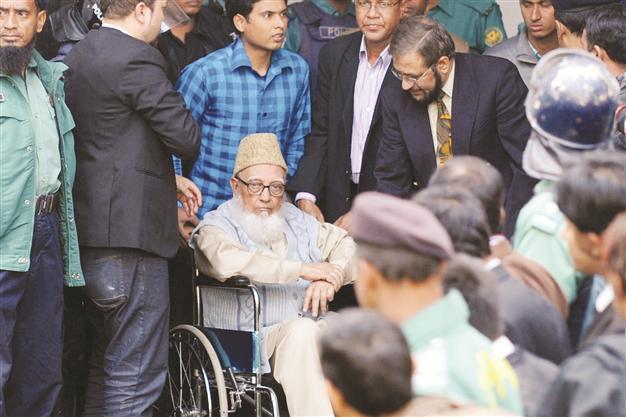Top Islamist found guilty of Bangladesh war crimes
DHAKA

The former head of the Islamist Jamaat-e-Islami party, Ghulam Azam (C), is escorted by security personnel outside the court in this 2012 photo. AFP photo
A 91-year-old former chief of an Islamic party in Bangladesh was sentenced to 90 years in jail today for crimes against humanity during the country’s 1971 independence war, angering both supporters who said the trial was politically motivated and opponents who said he should be executed.
A special tribunal of three judges announced the decision against Ghulam Azam in a packed courtroom in Dhaka, the capital.
The panel said the former leader of the Jamaat-e-Islami party deserved capital punishment, but received a jail sentence instead because of his advanced age and poor health.
Azam was in the dock when the verdict was delivered while protesters outside rallied to demand his execution. Both the defense and the prosecution said they will appeal.
Azam led Jamaat-e-Islami in then-east Pakistan in 1971 when Bangladesh became independent through a bloody war.
He is among several Jamaat-e-Islami leaders convicted by a tribunal formed in 2010 by the government of Prime Minister Sheikh Hasina to try those accused of collaborating with the Pakistani army in the war.
Previous verdicts by the tribunal have sparked widespread and deadly violence on the streets of a country that has a 90 percent Muslim population.
Gül sent letter last yearBangladesh says the Pakistani army killed 3 million people and raped 200,000 women during the nine-month war, and some 10 million people took shelter across the border in India.
Turkish President Abdullah Gül had requested late last year clemency for Azam by sending a letter to Bangladesh President Zillur Rahman. Gül had requested the Islamic leader not to be executed for the sake of peace in the society. Azam led the party until 2000 and is still considered to be its spiritual leader. Jamaat-e-Islami claims his trial and others were politically motivated, which authorities deny.
Street violence erupted across Bangladesh ahead of the judgment. Supporters clashed with police, who fired rubber bullets at Jamaat activists armed with homemade bombs.
Jamaat called a nationwide strike to protest the verdict, saying the war crimes trials are aimed at eliminating its leaders.
